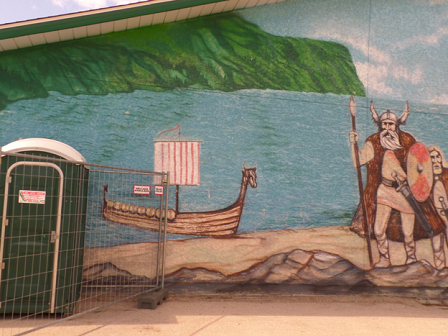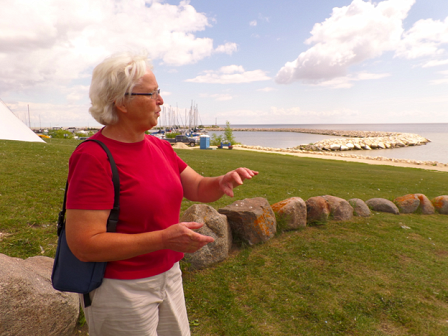Erstellt am: 5. 3. 2016 - 11:45 Uhr
Johnny's Journeys: The Proud Heritage of New Iceland
FM4 Reality Check: Our tour around the unique region of Canada called New Iceland will become available as a podcast and a "Saturday Special" on today´s Reality Check.

Johnny Bliss, 2016
People always seem really taken aback when I tell them I have visited Iceland eight times since 2009. They shouldn't be: I'm an Icelandophile. It's what we do. What should make people really question my sanity is the fact that, on top of all of that, I've also made a point of visiting the region called "New Iceland", in the middle of the Canadian prairie province of Manitoba.
Ever since I've heard this place existed, though, I've been fascinated.
* - and not the first. This eruption was of a volcano called Askja; the previous one, about a century before, was of a volcano called Laki.
Both eruptions were deadly serious, and made life difficult not just in Iceland, but also much farther afield in Europe and even Asia.
Apparently, in the late 1800s, there was a serious volcanic eruption*, and it made Iceland an even less attractive place to live than it normally was.
Yes, now Iceland is a really cool place with great coffee houses and fantastic music, but up until about the second World War, most people lived in abject poverty, and most homes did not even have electricity.
Post-war, there was an economic boom, the traditional fishing economy was industrialized, and suddenly people could afford things. If I was writing an article about Iceland, this would be the point where I would start describing how this was the point where the country's fortunes changed.
But I'm not writing an article about Iceland. I'm writing an article about New Iceland. Back in the old days when Iceland was a terrible place to live, harshly managed by Danish colonial rulers, and ravaged by epidemics, famine, and volcanic eruptions, many people were simply desperate for a better life. And so, many of them emigrated to North America.

Johnny Bliss
Approaching one hundred and fifty years later, the region is populated by about 30,000 people of Icelandic descent, and no one has forgotten it, either. Intriguingly, there is an annual "Iceland festival" every August, attended by thousands of people from both New and Old Iceland.
This about sums up everything I knew about New Iceland before coming to visit. Fortunately I met some colourful local characters, who were more than happy to fill me in.
Elva Simundsson
Before I arrived, I made contact with a local author and historian named Elva Simundsson. A chirpy, friendly woman, she also runs tours from the New Iceland Heritage Museum, and was more than happy to show me around and give me some insights into how New Iceland came to exist.

Johnny Bliss
"At that time, the US was filling up bit by bit [...], and [the Canadian government] were worried that they would come encroaching further north, and steal the rest of Canadian territory away from them. Once the American settlers would move in here, it would be harder to keep this area Canadian! So they were doing anything they could to fill this part of Canada up. [And then] they saw this group [of Icelanders] come in through the immigration... They were planning to head to Wisconsin, [until] some official said, 'well, hey, we'll give you anything you want if you stay here!'
"So they chose this chunk of land. They made it completely self-governing, and they said, 'you can do whatever you like! Write your own constitution, set up your own schools, set up your own churches, it's yours!'
"In 1887, they opened the reserve, and permitted other people to move in [and agreed to become part of the province of Manitoba]. [But] it's a unique piece of Canadian history; [we were] the only group given this kind of a privilege, or responsibility."
After our tour of Gimli, I thought it was time to check out some other parts of New Iceland. Elva suggested to me that I should meet her nephew and niece, two young farmers living in the neighbouring town of Arborg. They are, she said, both fascinated by not only Icelandic, but NEW Icelandic mythology and folklore. This intrigued me... and so, I went on a road trip!
The small town of Arborg is mostly populated by fishermen and farmers of Icelandic descent. Among those living here are Oðin and Alexandra, Elva's niece and nephew, who I hoped to meet to discuss their fascination with their heritage and its folklore. When I called them and told them their aunt Elva had put in a good word, they were more than happy to meet me.
At first they just told me Icelandic folk stories they'd been brought up with, many of which I'd already heard versions of on my own visits over. They shared old stories involving old Nordic Gods, and elves (or Huldufólk - hidden folk), trolls and sea monsters.
As fascinating as that all was, however, at a certain point, something even more interesting happened. Oðin began telling me folk stories that hadn't been brought with them from the old country - stories that were every bit as significant, but had their origin in New Iceland!
''The Newest Icelandic heritage story I've heard would have been when the Icelanders settled at White Rock. That's how they actually settled in Gimli! They were on a barge and they were being shipped across the river, and a storm [came up] and the ship captain decided that he was going to sink, and so he cut the barge, and turned around and went back to Selkirk.
"[The Icelandic settlers] washed up by White Rock. And that's also where the Huldufólk landed with them there.
"When they tell us stories of old Iceland, there's a lot more stories of elves and mythical beings, things like that... Out in the bush, they didn't have time to see these things, and they were struggling to survive when they first got here. But there's a few stories there, and most of those stories involve elves. Huldufólk, they were called!
"They were the hidden people. They were mischievous and you'd never see them, but they loved to pull pranks. The best prank they pulled was apparently in Gimli - in the school, they pushed a brick down, and it fell, and the school was left abandoned. [...] To this day it actually still stands there and it's not used as a school anymore."
Oðin and Alexandra also told me some stories about some of the severe storms that sometimes hit New Iceland:
Next up, we were on our way to the small town of Selkirk, where we'd arranged to meet a local fisherman by the name of Chris Christiansen. His family have been commercial fishermen here since the late 1800s.
Of all traditions you could follow out here, fishing is quite possibly the most Icelandic of all – so much so that back in the old country, all the coins are decorated with images of fish. Fish and Iceland go together like Canada and maple syrup, and so a feature about New Iceland would not be complete without a chat with a fisherman.
"All the old pioneer families here, the people who came here with nothing, half-starved and freezing, took to fishing because that's what they knew. Fishing became big for them commercially. It was nothing before that - Lake Winnipeg was not harvested really to any extent commercially, it was just a means of sustenance for some of the local half-starved people who were around this part of the world.
"But when the Icelanders came here, they turned it into a viable commercial sustainable business. And I can give you generations and names and books that my grandfather has shown me to PROVE that the Icelanders made Lake Winnipeg, no one else!
"We made it, Icelandic families, the pioneers. I mean, every time you go on the lake, you can feel a chill. You think you're the only one on the lake? You're not! There's nothing but ghosts on Lake Winnipeg."
Chris also told me some stories about storms on Lake Winnipeg:
And an accident on Lake Winnipeg:
Interview with an Icelander
In closing there was only one thing left to do: I'd spoken to several different people who were descended from Icelanders - but as it happens, even today some people are still moving over from the Old Country.
In Gimli, I made contact with a mechanic named Jón. Born in Reykjavik, he moved over here with his family because he still considers the whole Icelandic economy to be too unstable.
So he's a first generation immigrant. He runs his own auto repair shop, and I had to admit, I was wondering about his feelings about New Iceland, and its treatment of Icelandic heritage.
Business is booming for Jon, but he agreed to sit down with me in his garage during his lunch hour, to talk about what it's like to be an Old World Icelander living today in New Iceland.
"I used to say, after the bank and economy crash in 2008, this would probably be the only place in the world that you could be proud of being an Icelander. It was not good to be in Europe as an Icelander after that!
* - the term coined by Icelanders for the people who emigrated to Canada and North America
"The Western Icelanders* that are still speaking Icelandic, are second or third generation here, [and] most of [those] are around eighty-to-ninety years old. But of course there are many words that they don't have! Like when their grandparents moved over, there were no cars. They don't have any Icelandic word for car! [However,] there's no problem talking to them, and understanding them."
--
For more stories and knowledge shared by the Western Icelanders who farm and fish their livelihoods near the banks of Lake Winnipeg, tune in at 12 o'clock midday for an FM4 Reality Check Special, or check back here after the program for the podcast!
FM4 Reality Check
If you miss the program, you can still stream it via the Reality Check podcast or at fm4.ORF.at/player.


